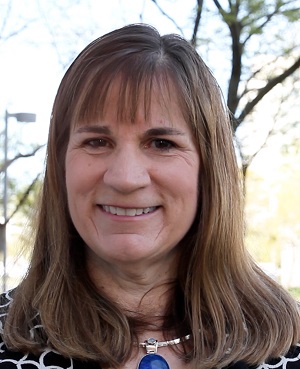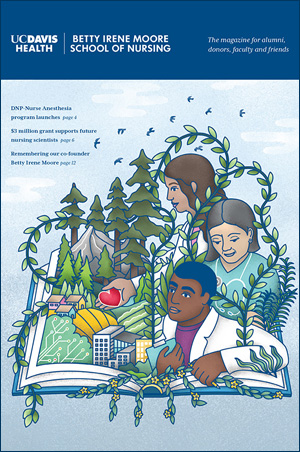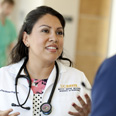Meet Elizabeth Rice
Program director embraces relationships to prepare nurse practitioners for the future
 Elizabeth Rice
Elizabeth Rice
Elizabeth Rice forged her own path as a nurse practitioner seeking to bridge the gap between physical health and mental health. Her career took her from practice, to research and then nursing education before she landed at the Betty Irene Moore School of Nursing at UC Davis to lead its family nurse practitioner program. Her goal: encourage nurses from diverse pathways to become nurse practitioners.
“I want to work with other people who want to focus, long term, on people being healthier overall,” Rice said. “At UC Davis, we work together as partners. Faculty, students, clinicians, researchers and others from a lot of different experiences come together to focus on health.”
Throughout her career, Rice focused on how she could make the best impact on health. When she first earned her nursing degree, Rice sought a specialty in psychiatric nursing.
“Mental health issues continue to be largely overlooked and the intersection of mental health and physical health is rarely discussed,” she explained.
So, Rice pursued a graduate degree that would enable her to research persistent mental illness and, hopefully, discover solutions along the way. She quickly learned that a career in research, especially in an area so widely unexplored as mental illness, tested her limits of time and energy.
“This was a problem because I couldn’t find the time to practice or teach, both areas where I feel I can make a significant difference,” she said.
Rice then decided to further her clinical education to become a nurse practitioner. Before joining the UC Davis Nursing Science and Health-Care Leadership faculty in 2015, she served as a faculty member at the University of Wisconsin, Madison, School of Nursing — both preparing future nurse practitioners and conducting mental health research.
Now, she especially enjoys discovering how these two areas intersect and how the preparation of future health care professionals can be improved by how the curriculum is presented and students are supported.
“That’s what drew me to UC Davis: this long-term, consistent and honest vision to not only change health care, but change health care systems through both research and how we prepare future providers,” Rice said. “People here think deeply about these issues and I want to be with people like that.”
She said it’s students who think in similar ways who should consider the nurse practitioner program at the Betty Irene Moore School of Nursing, too.
“At UC Davis, we prepare students with the tools to really think long and hard about what their education should mean to them individually,” she said. “Graduate education is two years of your life — two years of sacrifice, expense and immense effort on your part. What do you want that to mean to you?”
Rice said students who desire meaningful relationships as part of their education should look closely at UC Davis, where nurse practitioner students and physician assistant students learn together with an interprofessional faculty team.
“The very nature of this program is based on relationships and multiple perspectives,” she said. “We want students who are thoughtful about the types of experiences they want to have as part of their education.”
Relationships, Rice said, are a common thread throughout all of the school’s educational and research programs. She added that relationships are also at the foundation of each of the school’s core values of leadership development, interprofessional education, transformative research, cultural inclusiveness and innovative technology.
“For each of those areas, the ability to develop and maintain relationships with many different individuals is critical,” explained Rice. Additionally, Rice said the emphasis on multiple perspectives and varying experiences is woven throughout the two-year family nurse practitioner program in both the classroom and clinical education.
Because of the school’s mission to prepare nurse practitioners as primary care providers in underserved areas, Rice said the curriculum and faculty must fully prepare students who come from diverse backgrounds and experience.
“Whether a nurse who’s been in acute care for 10 years or a recent nursing graduate, our program is for nurses from all walks of life,” Rice said. ““At UC Davis, students will find faculty who are committed to their growth and truly want to see them succeed beyond their degrees.”





